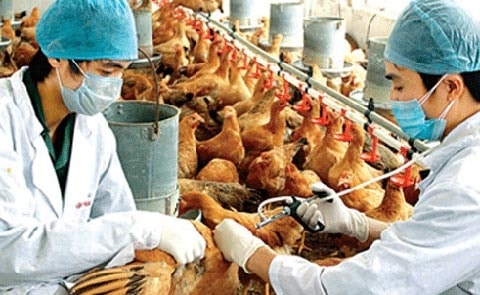A/H7N9 flu near the border
Poultry in Guangxi Province (China) tested positive for the A/H7N9 influenza virus. Only separated from Vietnam by a border, in the context of illegal poultry trading still going on, the risk of the disease entering Vietnam is imminent.
Speaking to the press on February 11, Mr. Tran Dac Phu, Director of the Department of Preventive Medicine (Ministry of Health) said that up to this point, China has recorded 330 cases of A/H7N9 flu, including 65 deaths. The number of patients with flu since the beginning of 2014 has tended to increase.
 |
| The A/H7N9 flu epidemic in China continues to be very complicated and has increased compared to 2013. |
Meanwhile, Guangxi province (China) which shares a border with Vietnam has tested positive for the A/H7N9 flu virus in poultry.
Other areas such as Hong Kong and Taiwan have also recorded cases after returning from mainland China. The World Health Organization (WHO) has not yet recommended travel restrictions but has advised people to avoid poultry markets.
Mr. Phu assessed that in the above context, the fact that Vietnam has not recorded any cases of A/H7N9 flu is "a great effort" but it is not yet known to what extent it can be maintained.
Measles outbreak is not unusual
Regarding measles returning in many localities, Mr. Tran Dac Phu said that isolating measles cases is necessary but difficult. Therefore, it is necessary to organize vaccination campaigns appropriately. Next August, the health sector will also organize a campaign to vaccinate all children under 2 years old against measles and rubella.
According to Mr. Phu, the measles epidemic is not unusual, but follows the 3-5 year cycle of the epidemic. Currently, the measles vaccination rate nationwide is high. If the first dose is given, about 85% of children are immune, if the second dose is given, it increases to 90%. So every year, there are 5-10% of children who have been vaccinated but still get sick, and when the cycle accumulates, it becomes an epidemic.
“The current difficulty is that the A/H7N9 flu epidemic occurs in poultry flocks but does not show symptoms in poultry flocks like the A/H5N1 flu. If the epidemic enters Vietnam, with the current small-scale, spontaneous farming practices, prevention and control work will be difficult,” Mr. Phu commented.
To prevent the risk of disease entering Vietnam, Mr. Phu said that what needs to be done well is to manage the disease in poultry flocks, especially the work of preventing and combating smuggled poultry.
Currently, in the A/H7N9 flu prevention plan, 4 epidemic scenarios are still developing as predicted, prevention work continues (monitoring people entering the country with remote temperature measuring devices, monitoring people with pneumonia at hospitals, taking samples for testing and deploying a key flu surveillance system in the provinces).
There are many types of flu circulating at the moment. Mr. Phu said that both WHO and Vietnam are monitoring for new strains, taking samples to analyze the virulence of each strain (including old strains) to see if the virus has mutated into a highly virulent strain.
Regarding the A/H10N8 flu epidemic, Professor Nguyen Tran Hien - Director of the Central Institute of Hygiene and Epidemiology said that recently the health sector has tested many cases of severe pneumonia suspected to be caused by avian influenza virus infection, however, up to this point in Vietnam there have been no cases of H10N8 flu infection in humans.
Prime Minister: Strive to prevent A/H7N9 flu from entering
On February 10, 2014, Prime Minister Nguyen Tan Dung issued an Official Dispatch on urging the implementation of tasks after the 2014 Lunar New Year holiday.
The Prime Minister's dispatch requested the Ministry of Health to strengthen the direction of epidemic prevention and control, especially epidemics that are at risk of breaking out in the winter - spring season, strive to prevent A/H7N9 flu and dangerous epidemics from abroad from entering Vietnam; strengthen the work of ensuring food hygiene and safety, preventing food poisoning, monitoring food safety at tourist businesses and festivals; ensure human resources, medicine, equipment, means of medical examination and treatment to serve the people, continue to improve the sense of responsibility and awareness of serving patients.
According to Vietnam.Net
